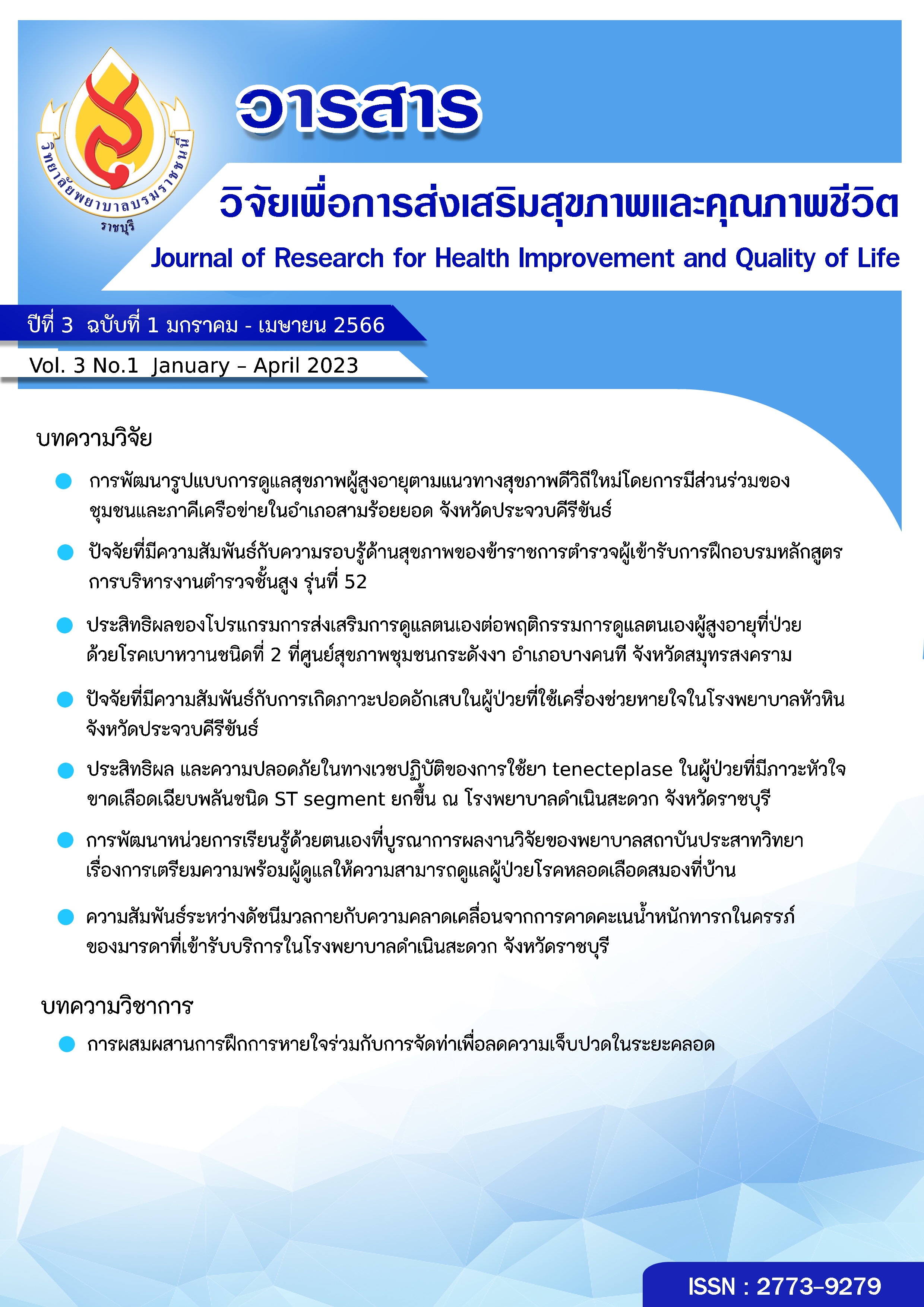การพัฒนาหน่วยการเรียนรู้ด้วยตนเองที่บูรณาการผลงานวิจัยของพยาบาลสถาบันประสาทวิทยา เรื่องการเตรียมผู้ดูแลให้ดูแลผู้ป่วยโรคหลอดเลือดสมองที่บ้าน
คำสำคัญ:
การพยาบาลโรคหลอดเลือดสมอง, ผู้ดูแล, หน่วยการเรียนรู้ด้วยตนเองบทคัดย่อ
การวิจัยนี้มีวัตถุประสงค์เพื่อวิเคราะห์และสังเคราะห์งานวิจัยที่ทำโดยพยาบาลสถาบันประสาทวิทยาและเพื่อ พัฒนาหน่วยการเรียนรู้ด้วยตนเองจากการบูรณาการงานวิจัยเรื่องการเตรียมผู้ดูแลให้ดูแลผู้ป่วยโรคหลอดเลือด สมองที่บ้าน ตัวอย่างเป็นงานวิจัยเกี่ยวกับผู้ดูแลผู้ป่วยโรคหลอดเลือดสมอง จำนวน 5 เรื่องเครื่องมือที่ใช้ คือ แบบสกัดข้อมูล และคู่มือลงรหัส แล้วจึงวิเคราะห์ข้อมูลด้วยกระบวนการเชิงคุณภาพ
ผลการวิจัย พบว่า กลุ่มตัวอย่างส่วนใหญ่เป็นงานวิจัยเกี่ยวกับการเตรียมผู้ดูแลมีลักษณะเป็นแบบ แผนการสอนที่ใช้แนวคิดทฤษฎีต่างๆ มาพัฒนาสมรรถนะของผู้ดูแล ได้แก่ ความร่วมมือ การใช้การสื่อสารที่มี ประสิทธิผล ความเชื่อความสามารถในตนเอง การใฝ่รู้ และแนวคิด M-E-T-H-O-D เพื่อให้สามารถเสริมสร้าง คุณภาพชีวิตที่ดีของผู้ป่วย ไม่มีภาวะแทรกซ้อน และไม่กลับเป็นซ้ำ และควรมีการสนับสนุนทางสังคมเพื่อเพิ่มความพึงพอใจในชีวิตของผู้ดูแล ส่วนหน่วยการเรียนรู้ด้วยตนเองที่พัฒนาขึ้นประกอบด้วยเนื้อหา 3 บทเรียนและหัวข้อย่อย คำแนะนำอธิบายวิธีใช้หน่วยการเรียนรู้ที่ระบุให้ผู้เรียนทำตามขั้นตอนในการศึกษาเนื้อหา ปฏิบัติกิจกรรมและใช้สื่อการเรียนรู้ แต่ละบทเรียนเริ่มต้นด้วยมโนมติที่พัฒนาจากการสังเคราะห์งานวิจัยที่ถูกแปลงเป็นวัตถุประสงค์เชิงพฤติกรรมครอบคลุมพุทธิพิสัย จิตพิสัย และทักษะพิสัย เพื่อเป็นแนวทางในการสร้างแบบทดสอบที่ใช้ทั้งก่อนและหลังเรียน
เอกสารอ้างอิง
Abbasi, K., Hazrati, M., Mohamadi, N.P., and Rajaeefard, A. (2013). The Effect of Learning via Module versus Lecture Teaching Methods on the Knowledge and Practice of Oncology Nurses about Safety Standards with Cytotoxic Drugs in Shiraz University of Medical Sciences. Iranian Journal of Nursing and Midwifery Research, 18(6), 483-87.
Banlengsong, J. and Gatepichayawatna, J. (2017). Factors related to Life Satisfaction of the Spouse Caregivers to the Elderly with Stroke. Thai Journal of Nursing, 66(3): 28-35. (in Thai)
Borisut, S. (2014). Effects of Nursing Management Model that Integrates King’s Nursing Theory with Collaboration Concept on Perceived Self-Efficacy of Caregiver in Promoting Safety Swallowing of Stroke Patient. (Independent Study. Faculty of Nursing). Bangkok: Saint Louis College. (in Thai)
Cavalcante, T.F., Nemer, A.P.L., Moreira, R.P., Ferreira, J.E.S.M. (2018). Nursing Intervention to the Patient with Stroke in Rehabilitation. J Nurs UFPE online, 12(5): 1430-36.
Changroj, K. (2020). Effects of the Discharge Planning using M-E-T-H-O-D Concept on Caregiver’s
Capabilities in Caring of Stroke Patient. (Independent Study. Faculty of Nursing). Bangkok: Saint Louis College. (in Thai)
Cramer, K.M., Ross, C., Plant, L., Pschibul, R. (2018). Efficacy of Learning Modules to Enhance Study Skills. International Journal of Technology and Inclusive Education, 7(1), 1251-59.
Goode, C.M. (2019). Evaluating the Quality, Usability, and Potential Effectiveness of Online Learning Modules: A Case Study of Teaching. (Dissertation Doctor of Education. Graduate School). Knoxville: University of Tennessee.
Jais, N.F.M., Ishak, S.A., and Yunus M.M. (2022). Developing the Self-Learning Interactive Module using ADDIE Model for Year 5 Primary School Students. International Journal of Academic Research in Progressive Education and Development, 11(1), 614-30.
Joanna Briggs Institute. (2014). Levels of Evidence. Retrieved October 18, 2022, from https://jbi.global/sites/default/files/2019-05/JBI-Levels-of-evidence_2014_0.pdf
Joanna Briggs Institute. (2022). Data Extraction. Retrieved October 10, 2022, from https://jbi-global-wiki.refined.site/space/MANUAL/4687700
Jongruk, B., Lertsakornsiri, M., and Chinnoros, S. (2019). Factors Associated with Competency of Professional Nurses in Caring Stroke Patients. PNUJR, 11(1): 38-49. (in Thai)
Kensakoo, T. and Srithumsuk, W. (2020). The Development of Registered Nurses’ Core Competencies in Neurology Nursing Care, Neurological Institute of Thailand. Journal of the Royal Thai Army Nurses, 21(3): 340-49. (in Thai)
Kummatid, A. and Markrat, M. (2016). Using the Systematic Review to Provide a Complete Summary on a Research Question in Evidence-Based Practice: A 3-Step Method. SCNJ, 3(3), 246-59. (in Thai)
LV, L., Guo, H., HU, L., Liu, Q., & XU, X. (2016). Correlation between self-efficacy and care ability of stroke patients′ family caregivers. Modern Clinical Nursing, 15(8), 6-10.
Maituch, S. and Tantiritisak, T., editors. (2009). Seamless Stroke Care in Thailand (Draft). Bangkok: Neurological Institute of Thailand. (in Thai)
Maneewan, S., et al. (2021). An Application of King’s Theory of Goal Attainment for Family Caregivers to Prevent Complications among New Case of Stroke. Journal of Health and Nursing Research. 37(2), 131-144.
Morse, J.M. and Field, P.A. (1995). Qualitative Research Methods for Health Professionals. (2nd ed.). California: SAGE; 1995.
Neurological Institute of Thailand. (2010). Stroke (Paresis, Paralysis): A Manual for People. (5th ed). Bangkok: Neuro-logical Institute of Thailand. (in Thai)
Neurological Institute of Thailand. (2018, May 28). Final Examination Report of Disease Specific Certification (Stroke). p 1. (in Thai)
Neurological Institute of Thailand. (2021). Annual Patient Statistics, 2020. Bangkok: Neurological Institute of Thailand. (in Thai)
Neurological Institute of Thailand. (2021). Report of Health Service System Development, NCD: Stroke, Fiscal Year 2021. Bangkok: Neurological Institute of Thailand. (in Thai)
Olaide, A.S. (2019). Nursing Care Practices to Improve Acute Stroke Care: A Descriptive Literature Review. (Thesis. Faculty of Nursing). Finland: Lahti University of Applied Sciences.
Pasukantapak, N., Borisut, S., and Pinyopasakul, W., editors. (2016). Clinical Nursing Practice Guidelines for Stroke. (1st ed). Bangkok: Tanaplace. (in Thai)
Ratanakul, J., Boonrak, P., and Boonjaroenlert, P. (2013). Effectiveness of Active Learning Program of Caregivers on Knowledge, Ability for Stroke Patient Care. (Research Report). Bangkok: Neurological Institute of Thailand. (in Thai)
Rujirarungrueng, N. (2008). The Effect of Coaching Program with Body Movement Training on Activities of Daily Living For Elderly Stroke Patients. (Thesis. Faculty of Nursing). Bangkok: Chulalongkorn Univrsity. (in Thai)
Samkumpim, T. (2016). Effects of Health Education Program Integrated with Effective Communication on Self-Efficacy Perceived by Stroke Caregivers. (Independent Study. Faculty of Nursing). Bangkok: Saint Louis College. (in Thai)
Sangpolsit, K. (2000). A Balance between Well Care Nursing and Ill Care Nursing in the 4-year Baccalaureate Nursing Programs of the Thai Public Sector. (Dissertation Doctor of Philosophy. Graduate School of Education). Philadelphia: University of Pennsylvania.
Satitpan, Ch. (2012). The Nursing Management of Discharge Planning Program for Stroke Patients at the Tertiary Level Hospital in Suphanburi Province. (Thesis of Nursing. Graduate School). Nakornpratom: Christian University of Thailand. (in Thai)
Smith, P. D., Martin, B., Chewning, B., Hafez, S., Leege, E., Renken, J., & Smedley Ramos, R. (2018). Improving health care communication for caregivers: a pilot study. Gerontology & geriatrics education, 39(4), 433-444.
Tohidi, S., et al. (2019). The Effect of Self-Learning Module on Nursing Students’ Clinical Competency: A Pilot study. Iranian Journal of Nursing and Midwifery Research, 24(2), 91-95.
ดาวน์โหลด
เผยแพร่แล้ว
ฉบับ
ประเภทบทความ
สัญญาอนุญาต
ลิขสิทธิ์ (c) 2023 วิทยาลัยพยาบาลบรมราชชนนี ราชบุรี

อนุญาตภายใต้เงื่อนไข Creative Commons Attribution-NonCommercial-NoDerivatives 4.0 International License.
บทความทีตีพิมพ์ในวารสารนี้ถือว่าเป็นลิขสิทธิ์ของวิทยาลัยพยาบาลบรมราชชนนี ราชบุรี และผลงานวิชาการหรือวิจัยของคณะผู้เขียน ไม่ใช่ความคิดเห็นของบรรณาธิการหรือผู้จัดทํา




